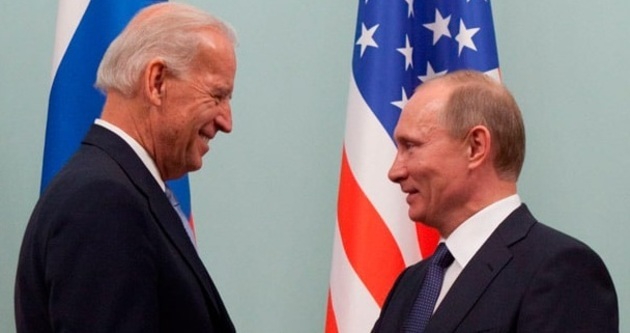Russian President Vladimir Putin and U.S. President Joe Biden held a phone call on December 30, according to the press service of the White House.
The leaders started their phone call at 15:35 Washington time (23:35 Moscow time), the talks between President Biden and President Putin ended at 4:25 p.m. Eastern Time (00:25 Moscow Time, on Friday).
According to the Kremlin, the talks were conducted with a goal of reaching a compromise taking into account each other’s principled positions.
Kremlin Aide Yury Ushakov said that Putin and his U.S. counterpart spoke about the security guarantees without touching upon the issues of bilateral agenda. "You know, this conversation was fully devoted to the issues of security guarantees, the particular issues of bilateral agenda were not touched upon," Ushakov said.
Meanwhile, Ushakov noted that the sides stressed that if the talks on security guarantees were successful, this will certainly "somehow normalize or even improve bilateral ties."
Speaking on what was the difference between this phone call and the December 7 video summit, Ushakov stressed that during the first contact Biden suggested tasking teams to follow up on the items. "Today’s conversation was a follow-up to this topic. Biden was well-prepared and made substantive remarks. For our part, we also outlined key principles for the upcoming talks," he stated.
Ushakov said that Biden agreed when Putin said Russia was seeking results in the talks on security guarantees. Putin told Biden about the principles that underlie Russia’s security proposals, the aide said. The president said talks were important but the key goal for Russia was its security and the country will seek to achieve that goal, Ushakov said.
"The U.S. president has generally agreed with that point of view and his reaction made sense and was quite serious," the aide said.
Putin also said Russia is concerned about deployment of offensive weapons near its borders and it will act just like the U.S. would act if it had to confront a deployment of such weapons near its own borders, Ushakov said, adding that Putin elaborated on the subject to drive the point home.
Ushakov noted that the Kremlin is satisfied with the talks between the leaders, viewing them as constructive. "Overall, we are satisfied with the conversation, since it was frank, meaningful and specific. I would say that <…> these talks were quite constructive," Ushakov said.
The Kremlin aide noted that the presidents were well prepared for the conversation, it was "really serious, although it was quite natural that the leaders congratulated each other on New Year’s holidays, wishing success to the Russian and American peoples."
"It is important that the American side has demonstrated its willingness to understand the logic and essence of Russian concerns <…>," the Kremlin aide stated.
Speaking about the progress in reaching a compromise, Ushakov noted that "it was not yet clear what could be considered as a compromise." "<…> The main thing for us is not to reach a compromise but to ensure the security guarantees that we urgently need," the Kremlin aide said.
The U.S. President "mentioned massive sanctions" and Putin responded they would be a huge mistake that could cause a complete severance of relations
Biden didn’t say exactly what Russian actions could trigger sanctions, Ushakov said when asked if Biden explained what kind of escalation on the Russian-Ukrainian border could set off the restrictions. "That wasn’t discussed in detail," he said.
Biden "mentioned massive sanctions" and Putin responded they would be a huge mistake that could cause a complete severance of relations.
Questions were asked to clarify what is meant by severance of relations with the West. "It doesn’t mean anything because we don’t know what these massive sanctions are, but we know they would be a colossal mistake that could lead to most serious consequences," Ushakov said.
"We hope that won’t happen," he said. "That’s why we, the Americans and other Western countries are starting a negotiating process along three tracks.".
According to the aide, Putin and Biden agreed to continue contacts next year and the exact date will depend on progress at the security talks. "The presidents, very importantly, agreed to continue the dialogue in the new year," Ushakov said.
The latest talks were "good, constructive and candid" and set a good tone for the negotiations in Geneva on January 9-10, he said. There are two other tracks for the talks: Russia-NATO in Brussels and Russia-OSCE in Vienna, he said.
The president agreed to stay in contact by phone as they supervise the Geneva and the other talks, Ushakov said. "They will talk as need be and will instruct their teams," he said.
He said he was unaware when Putin and Biden will talk next. It’s quite possible the need for a conversation will arise immediately after January 10, he said.
Putin said Russia attaches great importance to the talks but they shouldn’t descend into meaningless chatter, according to Ushakov. Russia is looking for a concrete result and will draw conclusions about the talks after several meetings, he said.
The Kremlin believes it’s important to hold bilateral talks with the US, even as the US wants to consult with its allies, Ushakov said. The aide said Biden reacted affirmatively.
This is the second conversation between the presidents over the past month. On December 7, Putin and Biden negotiated for two hours via video linkup. The sides focused on the situation around Ukraine, touched upon bilateral relations, cyber security and the Iranian nuclear deal.






